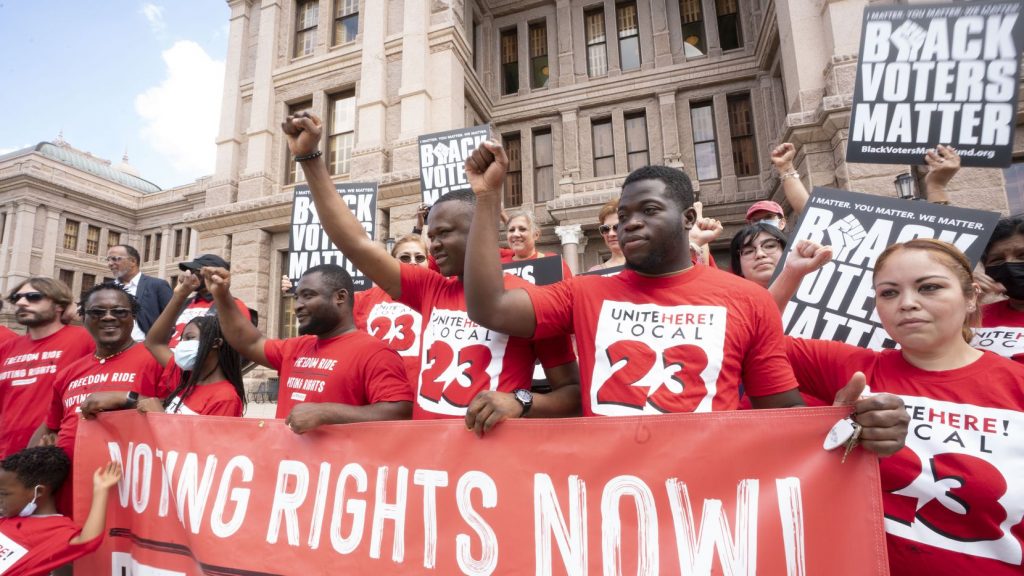The Texas state legislature is currently at a standstill around a Republican attempt to implement new restrictions on voting rights. Prompted by both Trump’s “stolen election” narrative and concerns about how to maintain power in the face of demographic changes that favor Democrats, Republicans have introduced similar legislation in 43 states in recent months. While Trump won Texas in 2020 by more than 600,000 votes, it was still the state’s second-closest presidential race in the last several decades. Rather than trying to expand its appeal to voters, the Republican Party is using its majority in the legislature to restrict democratic rights and maintain power.
U.S. voter participation is already low compared to other developed countries, in part due to the many legal and structural barriers that make voting so difficult for many people — especially workers and people of color. Originally, only white male property owners were allowed to vote in the United States, and the history of voting laws since then is a story of how the ruling class has sought to ensure that this remains the case in practice to the greatest extent possible. We see evidence of this in the fact that all but one of the states in which it is most difficult to vote are in the South, where the fight to repress the Black vote has always been strongest.
The current bills in Texas, House Bill 3 and Senate Bill 1, would make several changes to voting rules that would disproportionately affect workers, especially workers of color. By some measures, Texas already has the most restrictive voting laws of all 50 states.
What’s in the Bills?
The bills currently being discussed are revised versions of similar bills introduced earlier this year that were a direct response to measures taken to expand voting access in Harris County, the home of Houston — the largest city in Texas. These included increasing the number of polling places, keeping polls open later to accommodate people who work during the day, sending mail-in ballot applications to all voters, and implementing drive-through voting. The current versions are slightly better than the originals, but not by much.
The bills would add new identification requirements for mail-in voting, prohibit certain kinds of mail-in voting outreach, ban drive-through voting, and restrict early voting hours. In some cases, distributing applications for mail-in ballots to people who did not ask for them would become a felony — and that isn’t the only criminal penalty proposed for helping people vote. The bills would also force all polling places to have the same number of voting machines meaning larger venues such as gymnasiums would have limited voting capacity. They also include additional “protections” for partisan poll-watchers, who are theoretically present to ensure election integrity but in practice often are placed to intimidate voters, as in the case of sending armed white men to polling places in Black and Latinx communities. The bills also propose implementing monthly “citizenship checks” for registered voters flagged as being “potential non-citizens.” This will directly affect naturalized U.S. citizens profiled due to their status as immigrants.
How Are Democrats Responding?
Almost all the Democrats in the Texas state legislature have “fled” to Washington, D.C. in order to deprive the chamber of a quorum. Without a quorum, there can be no vote on the bills. They intend to stay in Washington for the remainder of the legislative session and are spending their time lobbying their federal counterparts to pass nationwide voting rights legislation. They lack the numbers in Texas to prevent the bills from passing, so a federal override to protect voting rights is their only hope. Meanwhile, hundreds of Texans from across the state traveled to Austin to testify against the bills.
Republican legislators back in Texas passed two measures in an effort to stop the exodus. They enacted a “call of the House,” which requires all legislators to stay in the state capitol building unless given special permission. They also authorized the sergeant-at-arms to use all measures within his power to bring the legislators back to Austin to vote, including arrests. The legislators are safe from Texas state jurisdiction, however, as long as they remain in Washington — making arrests an empty threat. Once the legislators return at the end of the legislative session, the governor has vowed to keep calling special sessions until the bills are put to a vote.
While Texas Democratic lawmakers have taken the most active stand to protect voting rights of all those in the 43 states where Republicans are trying to pass restrictions, it’s important to understand that Democrats see this first and foremost as an attack on their own ability to win elections. Republicans’ best shot at maintaining power may well be restricting ballot access, but the Democrats’ primary method of winning votes in recent years has been campaigning around the line of “better than the Republicans.” Fighting the Republicans on voting rights in Texas feeds directly into the Democratic Party’s interests and protects its own power — and potential to continue growing that power in Texas — without forcing the Democrats to make any new concessions to workers in order to appeal to voters.
Texas House Bill 3 and Senate Bill 1 are despicable power-grabs that should absolutely be fought, as should any bill that attempts to restrict people’s democratic rights. Congress passing a sweeping nationwide voting rights bill, which seems unlikely given opposition to eliminating the filibuster and Senate Republicans’ refusal even to discuss such a bill, would certainly be good for the working class. However, we must have no illusions that Democrats are on our side; they vote to protect us only when it benefits them to do so, and even a Democratic supermajority would ultimately serve the interests of capital.











